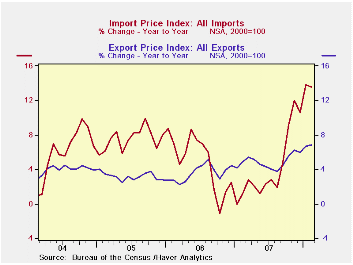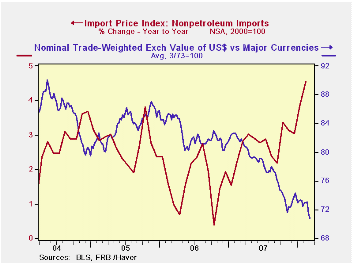 Global| Mar 13 2008
Global| Mar 13 2008U.S. Total Import Prices Eased, Nonoil Strongest Since 1995
by:Tom Moeller
|in:Economy in Brief
Summary
Overall import prices during February gained only 0.2% after a very firm, little revised 1.6% January increase. Expectations had been for a stronger 0.8% rise last month. Petroleum prices fell an unexpected 0.5% after a 4.8% surge in [...]

Overall import prices during February gained only 0.2% after a very firm, little revised 1.6% January increase. Expectations had been for a stronger 0.8% rise last month.
Petroleum prices fell an unexpected 0.5% after a 4.8% surge in January. That decline helped industrial materials prices to rise just 0.2%, but crude petroleum prices look to be up 8.0% this month versus February.
Less petroleum import prices were strong again last month and rose 0.6%. The lower foreign exchange value of the dollar has pushed the y/y increase in these prices to 4.5%, the strongest rate of increase since 1995. During the last ten years there has been a 66% (negative) correlation between the nominal trade-weighted exchange value of the US dollar vs. major currencies and the y/y change in non oil import prices. The correlation is a reduced 47% against a broader basket of currencies.
Prices for industrial supplies & materials excluding petroleum surged again, last month by 2.5% (12.5% y/y) led by another surge in chemical prices (23.9% y/y). Finished metal prices also have been strong (12.4% y/y) as have been paper prices (2.3% y/y). They are recovering after deflation last year. The detailed import price series can be found in the Haver USINT database.
Capital goods import prices rose just 0.1% (0.9% y/y) but that y/y gain follows a 0.4% increase last year and a 0.7% decline in 2006. Prices of computers, peripheral and semiconductors fell 0.5% last month (-5.0% y/y). Less the high tech sector, capital goods prices rose 0.3% (3.4% y/y) and here again the y/y increase is well elevated from a 2.7% rise last year and a 1.4% 2006 gain.
Finally, prices for nonauto consumer goods imports rose 0.3% in February (2.1% y/y) and the y/y rise in prices is now up from a 1.6% 2007 increase and a 0.4% uptick during 2006. Apparel prices are well up (2.0% y/y), double the rise of last year.
Total export prices have been quite strong with the 6.8% y/y gain led by a 30.8% jump in agricultural prices. That is followed by an accelerated 4.6% y/y gain in nonagricultural export prices which rose 3.6% last year.
Today's remarks by Treasury Secretary Henry M. Paulson, Jr. can be found here.
| Import/Export Prices (NSA) | February | January | Y/Y | 2007 | 2006 | 2005 |
|---|---|---|---|---|---|---|
| Import - All Commodities | 0.2% | 1.6% | 13.6% | 4.2% | 4.9% | 7.5% |
| Petroleum | -0.5% | 4.8% | 60.9% | 11.6% | 20.6% | 37.6% |
| Non-petroleum | 0.6% | 0.7% | 4.5% | 2.7% | 1.7% | 2.7% |
| Export- All Commodities | 0.9% | 1.2% | 6.8% | 4.9% | 3.6% | 3.2% |
Tom Moeller
AuthorMore in Author Profile »Prior to joining Haver Analytics in 2000, Mr. Moeller worked as the Economist at Chancellor Capital Management from 1985 to 1999. There, he developed comprehensive economic forecasts and interpreted economic data for equity and fixed income portfolio managers. Also at Chancellor, Mr. Moeller worked as an equity analyst and was responsible for researching and rating companies in the economically sensitive automobile and housing industries for investment in Chancellor’s equity portfolio. Prior to joining Chancellor, Mr. Moeller was an Economist at Citibank from 1979 to 1984. He also analyzed pricing behavior in the metals industry for the Council on Wage and Price Stability in Washington, D.C. In 1999, Mr. Moeller received the award for most accurate forecast from the Forecasters' Club of New York. From 1990 to 1992 he was President of the New York Association for Business Economists. Mr. Moeller earned an M.B.A. in Finance from Fordham University, where he graduated in 1987. He holds a Bachelor of Arts in Economics from George Washington University.
More Economy in Brief
 Global| Feb 05 2026
Global| Feb 05 2026Charts of the Week: Balanced Policy, Resilient Data and AI Narratives
by:Andrew Cates






